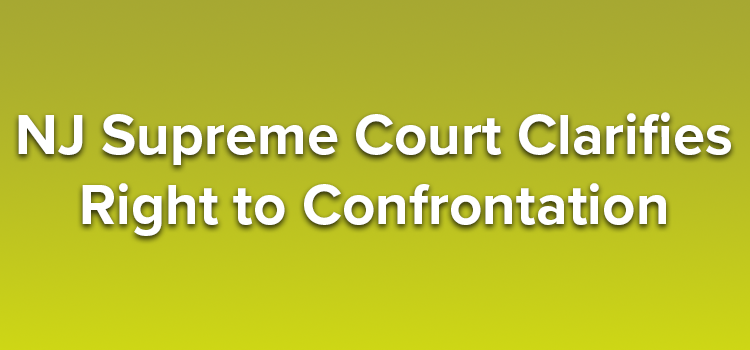In State v. Michael A. Jackson, (A-11-19/082735)(Decided July 2, 2020), the Supreme Court of New Jersey held that the defendant was deprived of his right to confrontation and denied a fair trial. According to the court, the jury should have had full access to the cooperating witness’s plea agreement history through the defense counsel’s unfettered examination of that history.

Facts of State v. Jackson
Tiffany Taylor, Javon Clarke, and defendant Michael A. Jackson were arrested and charged with participating in a burglary. Clarke accepted a cooperating plea offer in which he agreed to provide testimony inculpating defendant and Taylor in exchange for a three-year sentence. The trial judge urged modification of the plea agreement, suggesting Clarke’s sentencing exposure be lowered to 180 days in county jail, and probation. Under the new plea deal, Clarke testified that defendant and Taylor participated in the burglary.
In an effort to demonstrate Clarke’s bias in favor of the prosecution, counsel for Jackson sought to elicit during cross-examination the sentencing range of three to five years’ imprisonment that Clarke would have faced had he not accepted a plea offer in exchange for agreeing to testify against defendant. The trial court barred the line of questioning regarding Clarke’s maximum sentencing exposure, explaining that such information could improperly prejudice the jury if they heard Clarke’s maximum sentencing exposure on the same crimes as defendant. The trial court permitted defense counsel to elicit testimony regarding only the initial plea offer of three years’ imprisonment and the final plea agreement, in which Clarke accepted 180 days’ imprisonment in county jail, plus probation. The trial court permitting the State to use the low end of the sentencing range led to testimony that Clarke had not received “such a good deal.”
The jury acquitted defendant and Taylor of burglary and theft but convicted them of conspiracy to commit burglary. Defendant was sentenced to an extended term of seven years’ imprisonment. On appeal, defendant argued that the trial court’s limitation on the cross-examination of Clarke deprived him of his constitutional right to confront a key adverse witness. Defendant also argued that the limitation was exacerbated when the State was allowed to reference the low end of the range. The Appellate Division rejected defendant’s arguments and affirmed his conviction.
Confrontation Clause
The Confrontation Clause allows a defendant to explore, through cross-examination, the potential bias of a prosecution’s witness. While a trial court may impose reasonable limits on such cross-examination based on concerns about harassment, prejudice, confusion of the issues, the witness’s safety, or interrogation that is repetitive or only marginally relevant, etc., the competing interest proffered to limit a defendant’s confrontation right must be closely examined. In State v. Bass, 224 N.J. 285, 305 (2016), the New Jersey Supreme Court held that, “[i]f a witness faces a pending investigation or unresolved charges when he or she gives a statement to law enforcement, cooperates with the prosecution in preparation for trial, or testifies on the State’s behalf, that investigation or charge is an appropriate subject for cross-examination.”
NJ Supreme Court’s Decision in State v. Jackson
The New Jersey Supreme Court reversed. “The jury should have had full access to Clarke’s plea agreement history through the defense counsel’s unfettered examination of that history,” Justice Walter F. Timpone wrote. “We hold the trial court’s limitations on defendant’s cross examination to be in error.”
In his opinion, Justice Timpone noted that New Jersey state courts had not previously considered the scenario in which a trial court limits cross-examination into the term of imprisonment a cooperating witness avoided by testifying for the government where the defendant and witness were charged with the same crime. Looking to other jurisdictions, the court found that most state and federal courts have based their determinations on whether the jury had otherwise heard enough information to evaluate the witness’s credibility. The Court also found that the principles articulated in Bass applied.
Based on the foregoing, the court went on to conclude that Defendant was entitled to question Clarke about his subjective understanding of the benefit of his plea bargain, including what sentence he faced and what was offered in the plea agreement. According to the court, “This case is a particularly compelling example of the import of a fulsome right to confront adverse witnesses,” noting that Clarke was the State’s key witness testifying at trial, his testimony was the only evidence tying defendant to the crime, and the record revealed that Clarke acknowledged lying to police officers on several occasions about the events that transpired during the burglary. Justice Timpone further explained:
The potential for an extended-term state prison sentence may have served as a powerful incentive for Clarke to cooperate with the State. The trial court barred all testimony about the maximum sentence Clarke faced, which in turn prevented the jury from hearing the effect that sentencing exposure had on Clarke’s mindset when negotiating his plea with the State. The jury should have been made aware that Clarke entered into a plea bargain with the State and that, by virtue of his plea bargain, Clarke faced only 180 days in county jail instead of a lengthy term in state prison.
The New Jersey Supreme Court also rejected the State’s argument that if an error was committed, it was harmless. “The State substantially premised its case on the jury’s acceptance of Clarke as a credible witness. Had the jury been aware that Clarke was potentially facing an extended term of ten years in state prison when taking a plea deal of 180 days in county prison, it may well have drawn an inference of bias,” Justice Timpone wrote. “Additionally, the jury acquitted defendant and Taylor of burglary and theft. Such an inference of bias could have further affected Clarke’s credibility as the State’s key witness, and perhaps yielded a full acquittal.”
The court remanded the case for a new trial on the conspiracy charge.
